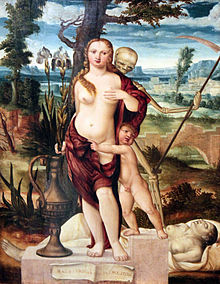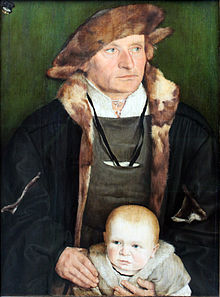Barthel Beham
Barthel Beham (* around 1502 in Nuremberg ; † 1540 in Bologna , Italy ) was a German painter and engraver. He was the younger brother of Hans Sebald Behams and initially seems to have learned from him. The artistic influence of Albrecht Dürer was initially obvious, but Barthel Beham turned more and more to the Italian High Renaissance. He became an extremely sought-after engraver and portraitist .



Life
At the age of eighteen, Barthel Beham appeared in his hometown in 1520 with remarkably well-made copperplate engravings. In 1524, after Thomas Müntzer stayed in Nuremberg , the brothers Beham and Georg Pencz , a journeyman of Dürer, were religious and political in line with the radical wing of the Reformation and joined the social revolutionary movement of the Anabaptists . The city council of Nuremberg imprisoned the "three godless painters" and other "swarming spirits" on January 12, 1525, subjected them to a sharp interrogation in which Barthel was said to have behaved very harshly and arrogantly, and banished them in agreement with the clergy on January 26, 1525 for heresy from her hometown.
Barthel Beham returned to Nuremberg just eight months later. However, he soon turned his back on Nuremberg and moved to Munich. Here he first worked in the workshop of Wolfgang Muelich and in 1527 entered the service of Duke Wilhelm IV as a court painter , a staunch opponent of the Reformation, but a humanist -minded promoter of art and artists. Beham's special skills as a portraitist were soon recognized, which earned him numerous commissions from the court and the Munich patriciate . In 1530 he painted Emperor Charles V and his brother, King Ferdinand of Hungary and Bohemia , on the occasion of their solemn entry into Munich. As a copper engraver, in particular, he distinguished himself through extremely carefully executed and technically perfect work. In 1540 the duke sent his court painter to Italy to perfect his painting technique, where Barthel Beham died after a short illness at the age of 38.
Works (selection)
- Lady at the toilet, 1534 ( Augsburg , Schaetzlerpalais )
- Vanitas, 1540 ( Hamburger Kunsthalle )
- Two works in the Museum zu Allerheiligen
- Hans Urmiller with his son ( Städelsches Kunstinstitut , Frankfurt am Main)
- Portrait of Magdalena Neudorffer, Portrait of Johann Neudorffer ( Gemäldegalerie Alte Meister (Kassel) )
Auctions
- 1825 in Nuremberg : Half-length portrait of a young woman in old German costume and in almost full view. (Clara Pfinzing 1522)
exhibition
- 2011: The godless painters of Nuremberg - Sebald and Barthel Beham. Albrecht Dürer House , Nuremberg
literature
- Thomas Muchall-Viebroock: Beham, Barthel. In: New German Biography (NDB). Volume 2, Duncker & Humblot, Berlin 1955, ISBN 3-428-00183-4 , p. 4 ( digitized version ).
- Alfred Woltmann: Beham, Barthel . In: Allgemeine Deutsche Biographie (ADB). Volume 2, Duncker & Humblot, Leipzig 1875, p. 277 f.
- Herbert Zschelletzschky : The three godless painters of Nuremberg. Sebald Beham, Barthel Beham and Georg Pencz. Historical bases and iconological problems of your graphics on the Reformation and Peasants' War . EA Seemann, Leipzig 1975, DNB 760254427 .
- Kurt Holes: Barthel Beham. A painter from the Dürer circle . Deutscher Kunstverlag, Munich / Berlin 1999, ISBN 3-422-06261-0 .
- Jürgen Müller, Thomas Schauerte (ed.): The godless painters of Nuremberg. Convention and Subversion in the Beham Brothers' prints. Exhibition cat. Albrecht Dürer House Nuremberg, March 31 to July 3, 2011 in cooperation with the Collaborative Research Center 804 “Transcendence and Common Sense”. Edition Imorde, Emsdetten 2011, ISBN 978-3-942810-01-2 .
Web links
- Städel
- Exhibition information of the Albrecht Dürer Haus, Nuremberg ( Memento from February 21, 2014 in the Internet Archive )
- Literature by and about Barthel Beham in the catalog of the German National Library
Individual evidence
- ↑ WU Guyan: Tour of the Museum zu Allerheiligen Reprint of the WU Guyan museum guide from 1973. Additions by the museum management 1982, p. 129.
- ↑ DIRECTORY OF THE v.DERSCHAUISCHE Kunstkabinett zu NÜRNBERG .... Nuremberg, at the obligated auctionator Schmidmer., 1825., 250 p., Directory of rare art collections., 1825., Google Books, online , p. 67 ( 23)
| personal data | |
|---|---|
| SURNAME | Beham, Barthel |
| BRIEF DESCRIPTION | German painter and engraver |
| DATE OF BIRTH | around 1502 |
| PLACE OF BIRTH | Nuremberg |
| DATE OF DEATH | 1540 |
| Place of death | Bologna , Italy |
